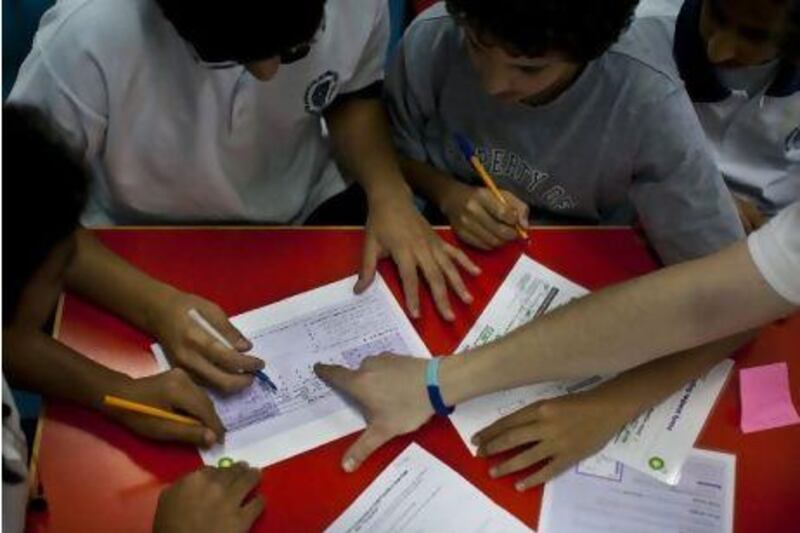With the beginning of the new academic year just a month away, Emirati parents are frustrated as private schools around the capital increase their fees.
Education has always been a hot topic of discussion in Emirati majlises, with parents looking to enrol their children in the best institution so they stand out in the expatriate dominated job market.
One of my Emirati colleagues resigned from her government role to instead work at a new semi-government organisation that paid for her children's private school fees - a benefit she highly valued.
In an attempt to address the issue, the Abu Dhabi Education Council is providing high quality instructors and materials to state schools, enabling children to receive an education at a much lower cost than they would at the private institutions.
The Government wants to ensure that all schoolchildren are armed with the best knowledge to then be able to go on to tackle university degrees.
But what many parents are not aware of is that despite their worrying, little Ahmed or Mouza may well not end up doing anything they have ever heard of, or that they will find work in what would now be considered still a new field.
Mouza may not become a genetic engineer, and Ahmed may not be programming a financial institution's apps. Even what are regarded as such new fields of engineering now may well be old hat by the time they enter the workforce.
I have recently been intrigued by this fact and if you have met me, you will also know that I will have instantly hopped on to Google to find out more.
With a click of a button, the search engine generated numerous reports by business executives and scholars, who stated that in developed nations such as the US and Australia, 65 per cent of schoolchildren will go on to ply trades that none of us old-timers ever considered - and will do so in only a few years from now.
Shocking? Very. But what are the new professions we should be expecting?
My search suggested farmers would be the order of the day for tomorrow's workforce, but not those who toil in the fields to grow our food. No, these were "knowledge farmers", and something called "location intelligence farmers" - such as the folks who are linking Google Maps data to existing processes and services.
Simply put, we cannot keep preparing students with old educational techniques for a world that will not exist by the time they join the workforce. For the sake of two-thirds of elementary children, it is crucial we redesign education.
A friend of mine who studied abroad at one of the world's prestigious universities told me how her professors still preferred the "old way of doing things".
Term after term, and year after year, a large chunk of her grades depended on her "term paper", and while she presented excellent arguments, she still lost marks because of minor spelling or grammatical errors. She thought it unfair that her thoughts could only be expressed in just one form.
"My bad writing is a product of the form of writing required at university. Just because my professors do not how know to operate new writing expression platforms such as Twitter, and blogs, that does not mean we should not be using them to deliver our argument." she says.
You may wonder now, how will the job market prepare the Emirati youth for the unknown?
One way is by further developing educational material that aims to equip students with complex skills to become digitally literate, which will, in turn, help to sustain the UAE's economy in a fast-pace changing market.
Here, also is where the scholarship institutions can play a role. It is vital that Emirati students are directed to pursue fields that will enable them to be able to tackle the ever-changing work fields - jobs that will require the application of analytical and cognitive skills.
We should not ignore that there should be a need for strong ties between educational departments and the Ministry of Economy -both must be on the constant lookout of what the job market demands.
In that way, the country would not waste millions of dirhams on outdated degrees, and at the same time it would have access to a large pool of qualified Emirati candidates.
Finally just as with any change, the process should start at the home.
Parents should make their children aware that the jobs of the future will lie in the private and semi-private sector.
It is important to address the private sector's crucial role in developing the UAE economy, just as it is anywhere worldwide. This awareness should be emphasised by the Government, and integrated into school curriculums.
Time is money now, and this is an issue that cannot wait any longer.
* Manar Al Hinai, an Emirati, is a fashion designer and writer based in Abu Dhabi. She was recently named an Arab Woman of the Year





